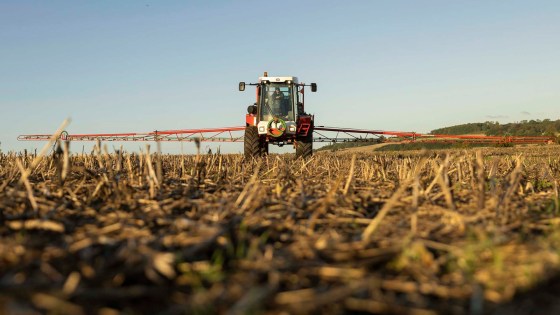LUXIMO® ON FARM: Tom Sewell
2023/2024
About Tom
Tom is a second-generation farmer at Sewell Farms, near Maidstone in Kent. The business is a family partnership between Tom, his wife Sarah, and his parents. The 100% arable enterprise runs a no-till farming operation across both their owner-occupied land and the areas they rent.
They are farming 560 ha including their own land and that of 17 landowners, all within a 6-mile radius of the home farm. This offers short-term security so building strong relationships is key, for example they take great care to look after the soil and the hedges on both their own and rented land.
Tom is probably best-known for his work on improving his farm’s soil health, having won Soil Farmer of the Year in 2021. The foundations of this were laid back in 2013 when he completed a Nuffield Scholarship which investigated regenerative agriculture using no-till systems. This opened his eyes to the potential benefits of no-till, and he was one of the first UK farmers to use a Cross-Slot drill, which he built himself. Unsurprisingly, no-till, in combination with cover crops, has been a key strategy for this forward-thinking farmer in his battle against black-grass.
Tom was a Luximo® trialist in autumn 2021 and a Luximo® user in autumn 2022 and 2023.

Black-grass
“About 10 years ago black grass became more of a problem,” says Tom. “We’ve employed a combination of strategies since then, a range of chemistry, no-till, cover crops, delayed drilling, spring cropping and spraying off flushes in between crops. I firmly believe that using all these things together is the way forward.
“Each year is different, so the goalposts are constantly moving. That means not only using all the tools we can, but being flexible in how we use them. It’s essential to walk crops all the time and be prepared to treat each field individually.”
Autumn 23 and spring 24
The wet autumn of 2023 and spring of 2024 has caused an explosion in the black-grass populations on farm.
“In the autumn we did get quite good flushes of black-grass which we sprayed off before drilling and we planted some blocks of first wheats that now look really good - pretty clean of black-grass.
“We have other blocks, however, that look quite dirty. During the six months of wet weather, it was also mild with a winter free of hard frosts, so it was growing weather right the way through and then we had a wet January, February and March. This meant every opportunity to get another flush of black-grass was there.”
Tom has had success growing spring oats to control black-grass.
“We usually plant them in April, after a good couple of flushes of black-grass. Spring oats are competitive and smother the ground quickly, also I don’t think black-grass likes to grow with oats, I think there is an allelopathic effect of the oats on the black-grass.”

Rotation
Tom’s rotation has changed this season both because of SFI and the wet autumn. Currently he has winter wheat and spring oats in the ground and two stewardship agreements and two SFI agreements across the land he farms.
“We are using the SFI as a rotational break and on poor land to take certain fields out of production that are more isolated or just those awkward corners or areas of poorer soil. It will then go into winter wheat and hopefully we will get some good yields. We are hoping that having the SFI as a break will give us the opportunity to control black-grass, improve soil fertility and grow some fairly mixed cover crops.”
Tom’s top tips for black-grass control
- Delay drilling (of all crops!)
- Create as many stale seedbeds as possible
- Use competitive spring crops



